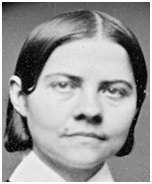|
 |
|
 |
|
|
||
Lucy Stone - Suffragettes and Leadership
Lucy Stone (1818-93)
American suffragette (pictured right) , who fought for:
Why was she successful and a great leader?
1. Principles She was the first woman in America to keep her own name after marriage, and so assert her rights as an independent woman. This became known as 'doing a Lucy Stone'. She said, “My name is my identity and must not be lost”. She strongly believed that everybody should have the same rights, as laid down in the American Constitution, whatever their sex or colour.
2. Support She was supported by:
They all helped her to found and publish in 1870 the suffragette publication, The Woman’s
Journal.
3. Purpose Driven by her strong Christian beliefs, her aim was summed up by her last, dying words to her daughter: “Make the world better”. In particular, she wanted women to have the same rights and opportunities as men, because: “In everything disappointment is the lot of women”, she said. But she insisted that they should never neglect their family responsibilities, because “A woman’s truest place is in a home, with a husband and with children”. 4. Determined action Stone (pictured right as a young woman):
5. Influence She inspired many people to fight for women’s rights, including:
Mill and Taylor wrote their influential article, The Enfranchisement of Women, after reading
one of Stone’s speeches.
Key quote on objectives and vision Make the world better.
Key quote on women My name is my identity and must not be lost. Women are in bondage. In everything disappointment is the lot of women.
Key quote on family A woman’s truest place is in a home, with a husband and with children. |
|
|
||
|
|
||
| Copyright © wisdomtowin.com 2025 All Rights Reserved | ||
|










